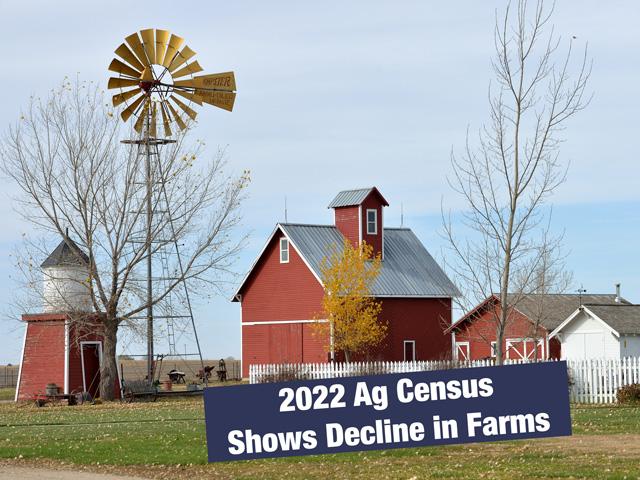2022 Ag Census Released
Ag Secretary Calls Decline in Farms and Acreage a 'Wake-Up Call'
OMAHA (DTN) -- The U.S. lost nearly 142,000 farms and 20.1 million ag acres from 2017 to 2022, which Agriculture Secretary Tom Vilsack said should be a "wake-up call" for policymakers.
USDA released its 2022 Ag Census on Tuesday, a five-year survey that takes a snapshot of American farmers and their operations. The data is used by policymakers to help determine local funding for a range of USDA programs as well as highlight the needs of farmers and ranchers going forward.
The 2022 Ag Census came after the impact of the COVID-19 pandemic on agricultural operations. The survey's snapshot also came in a year that had both record net farm income, but also high inflation that affected farmers' input prices.
In an event rolling out the survey results, Vilsack called the loss of both farms and acreage "significant" and "a wake-up call" to USDA and Congress.
"Are we OK with losing that many farms?" Vilsack said. "Are we OK with losing that much farmland or is there a better way? That's the importance of this survey. It allows us to take a snapshot in time and compare what has occurred over the last five-year period and begin asking ourselves questions about the policy formation and the direction that we need to take to correct or deal with some of the challenges that the data presents."
FARMS AND ACRES
The 2022 Ag Census showed a decline in farm operations of every size category from the smallest to the largest.
The number of U.S. farms fell below 2 million for the first time, down to 1.9 million farms. The survey shows a loss of 141,733 farms.
The country lost 304,305 farms since the 2007 Ag Census -- the last time the Ag Census reported an increase in farms nationally.
Looking at larger farms with 1,000 or more acres, the 2022 Ag Census reports 13,721 fewer farms than five years earlier.
With the smallest farms -- those with less than 10 acres -- the census showed a drop of 38,733 farms -- even after the 2017 Ag Census had reported nearly 50,000 more smaller farm operations compared to 2012.
P[L1] D[0x0] M[300x250] OOP[F] ADUNIT[] T[]
ACREAGE
Total farm acreage, including cropland and pasture, was 880.1 million acres in 2022, a loss of more than 20.1 million acres of farm production.
Still, with the decline in overall farm numbers, the average farm size was 463 acres in 2022, up 5% or about 22 acres on average from 2017.
The 20.1 million acres lost from 2017 to 2022 would have supported 43,448 "average size" farm operations.
From 2017 to 2022, crop farmers reported 382.36 million acres planted, more than 14 million acres less than in 2017. The number of crop acres is down nearly 63 million acres since the 1997 Ag Census.
INCOME AND FARM CONCENTRATION
Less than 1% of farm operations, or 16,226 farms, in 2022 reported more than $5 million in sales. Those farms generated $229.6 billion in sales in 2022. Those farms averaged $14.15 million each in sales.
Out of 1.9 million farmers, there were 586,286 farms, or nearly 31% of farms, reporting sales of under $2,500. They combined to generate $406.2 million in sales or an average of $692.83 per farm.
Looking at market concentration, USDA shows just 26,214 farms, about 1.4% of all farms, account for 50% of all sales for all products. Broadening it out, 89,210 farm operations account for 75% of all sales, an average of $12.7 million in revenue for each farm, and those farms average about 2,703 acres in size.
All farm production expenses topped $424.14 billion in 2022, up $97.75 billion from five years earlier, or 23% higher. Livestock feed was valued at $88.37 billion, up $25.75 billion from five years earlier. Fertilizer expenses were $36.14 billion, up $12.6 billion or 34.8%. Hired labor cost $41.8 billion or $10.2 billion more than in 2017.
DEMOGRAPHICS
While the country lost 142,000 farms from 2017 to 2022, the number of overall producers was 3.374 million, down about 25,790 producers from 2017.
According to the census, 2.149 million producers were men and 1.224 million were women in 2022. The number of men producers fell by 23,055 from 2017 and the number of women producers declined by 2,735.
Of those farmers, 1.4 million listed farming as their primary occupation while another 1.96 million farmers listed "other."
The majority of farmers -- 2.28 million -- have been on their present farms for more than 10 years. The average number of years on the present farm is 21.2 years.
The average age of farmers in 2022 was 58.1 years old, up from 57.5 years in 2017.
Vilsack pointed to the continued rise in the average age of farmers as a need to encourage more young people into the profession.
"We continue to see the aging nature of our farming community," Vilsack said. "We recognize the importance of making the case to bright young people about the career opportunities and the changes that you have to make a fundamental difference in agriculture and food."
Looking at race, 3.219 million farmers were listed as white and 112,379 farmers reported as Hispanic or Latino. American Indian or Alaskan Natives made up 56,203 farmers while 41,807 farmers were listed as Black or African American.
There were 112,379 farmers listed as "Young Producers," defined as 34 years of age or younger.
The 2022 Ag Census https://www.nass.usda.gov/…
Chris Clayton can be reached at Chris.Clayton@dtn.com
Follow him on X, formerly known as Twitter, @ChrisClaytonDTN
(c) Copyright 2024 DTN, LLC. All rights reserved.




